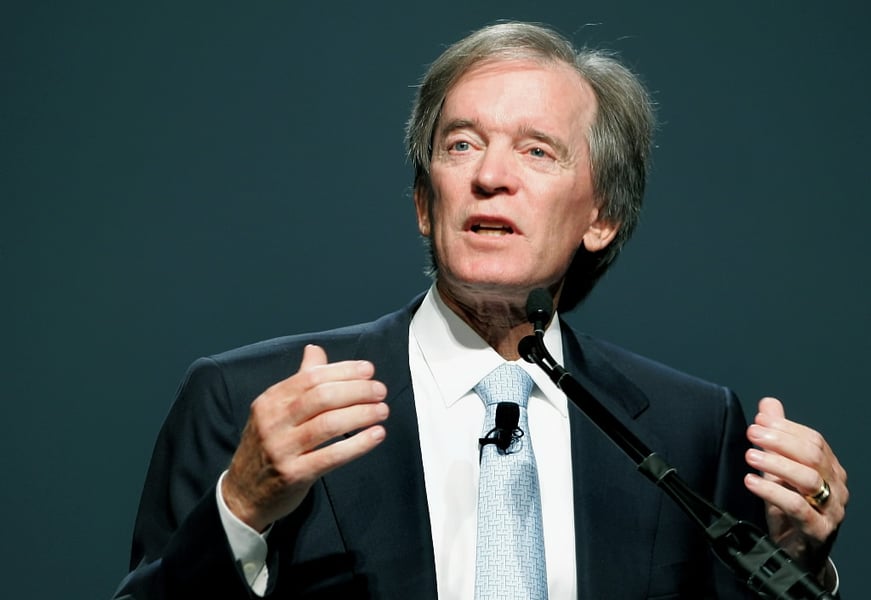Pimco's Bill Gross said Bank of New York Mellon Corp.'s decision to charge clients for large deposits shows how the government's efforts to revive the economy are distorting markets and hurting savers.
Bill Gross, who runs the world's biggest bond mutual fund at Pacific Investment Management Co., said Bank of New York Mellon Corp.'s decision to charge clients for large deposits shows how the government's efforts to revive the economy are distorting markets and hurting savers.
“The Swiss have done that but in the United States, it's supposedly unheard of,” Gross said during a radio interview today on “Bloomberg Surveillance” with Ken Prewitt and Tom Keene. “I've earned 0.1% on my money-market account for about two-and-a-half years; it's what is called financial repression, where interest rates are much lower than inflation.”
Gross, 67, manager of the $245 billion Pimco Total Return Fund, has said since May that savers have been hurt as the Federal Reserve has kept its rate at zero to 0.25% for three years. The policy, meant to keep market rates low and encourage borrowing, has also helped the government reduce the cost of servicing its debt, he said.
“The fact is for the next several years, maybe for the next decade, financial repression will take place and you will earn much less than the rate of inflation on your savings deposits,” Gross said today.
Excess Cash
BNY Mellon said yesterday it will charge clients with more than $50 million 13 basis points, or 0.13 percentage point, for “excess amounts” of cash they deposit with the bank. Custody banks like BNY Mellon have been flooded with cash as the European debt crisis, the debate over the U.S. debt ceiling and the stock market selloff prompted institutions to seek the safety of insured bank accounts.
A global rout in equities drove the Standard & Poor's 500 Index to its worst slump since February 2009 yesterday, while two-year Treasury yields plunged to a record low. The S&P 500 tumbled 4.8% to 1,200.07 yesterday in New York. It has dropped 11% since July 22, the biggest loss over the same amount of time since March 2009.
Demand for short-term government debt instruments is rising after the U.S. signaled it won't increase sales of Treasury bills even following lawmakers' agreement to raise the debt ceiling. One-month Treasury bill rates traded at zero percent yesterday after earlier falling to negative 0.0102%. They reached 0.1825% on July 29, the highest since February 2009.
French Spreads
Gross has more than doubled his investments in non-U.S. developed countries in his Total Return fund to 13% in June from 6 percent in April, according to data released last month. The fund had 11% of its holdings in emerging markets. It holds about 9% in Treasuries, up from 8 percent in June, he said in a Bloomberg Television interview on Aug. 2.
Along with the debt issues and slowing growth in the U.S., markets are nervous about the sovereign debt crisis still unfolding in Europe, Gross said. He cited the widening of bond spreads in France relative to Germany over the past week as a sign of how nervous investors are about the risks in Europe.
“Resolution in Euroland is key, and the primary reason why the risk markets were so weak over the past week,” he said. Gross said he favors debt sold by Canada, Australia, Brazil and Mexico, sovereigns that have good balance sheets while offering higher yields.
The debt-ceiling compromise reached by Congress last weekend won't make a “significant dent” in U.S. deficits, Gross said in his monthly investment outlook posted on Newport Beach, Calif.-based Pimco's website earlier this week.
‘Unfathomable' Debt
“In addition to an existing nearly $10 trillion of outstanding Treasury debt, the U.S. has a near unfathomable $66 trillion of future liabilities at net present cost,” Gross wrote in his commentary.
Trillions of dollars in future spending cuts and tax increases are still necessary to stabilize the U.S. debt ratio as a percentage of gross domestic product to maintain a AAA credit rating, Gross wrote. President Barack Obama on Aug. 2 signed into law a debt-limit compromise bill that will defer decisions on the nation's finances to a bipartisan panel and may only modestly reduce deficits while slowing economic growth.
The Total Return Fund has returned 5.7% in the past year, beating 61% of its peers, according to data compiled by Bloomberg. This year, the fund has advanced 4.4% through Aug. 3, lagging behind 55% of rivals. The firm managed $1.3 trillion in assets as of March 31.







